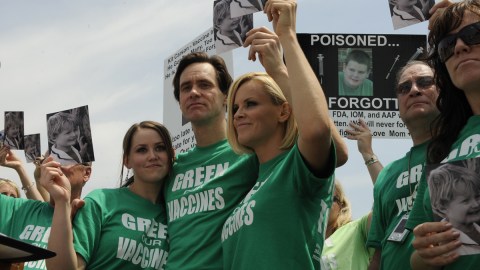Frontline’s The Vaccine War: The Politics of Medicine and Parents

Last week Seth Mnookin, author of the Panic Virus, kicked off the inaugural event in the new Science in Society Film and Lecture series at American University, sponsored by the School of Communication. You can read a news story about the event and video available too. As a follow-up, Sarah Sonies, a graduate student in this semester’s “Science, Environment, and the Media” course, contributes a guest post reflecting on last year’s related Frontline episode “The Vaccine Wars.”–MCN
—
In April 2010, PBS aired an episode of its public affairs television series, Frontline, which discussed an emerging phenomenon in the public health world: parents who are averse to vaccinating their children against diseases like the mumps, chicken pox and Hepatitis B.
The special, titled “The Vaccine War,” illustrates the controversial rise of a new generation of parents who are unsure about the possible risks of vaccines and have chosen to either discontinue with their children’s vaccinations or have refrained from having their children vaccinated at all. The decision made by these parents across the country to “opt out” their children from vaccinations, specifically the Measles Mumps and Rubella (MMR) shot, has led to a debate between concerned parents and the medical field, which has only intensified with the evolving social media environment.
As discussed in the Frontline special, the “great vaccine debate” had its origins in the context of the MMR vaccination. In 1998, Andrew Wakefield, a British doctor who has since been stripped of his medical license, published an article in the medical journal The Lancet, which claimed the MMR vaccination gave children gastro-intestinal problems that led to autism.
According to a February 2010 ABC News article (“Autism and Vaccines: Lancet Retracts Controversial Autism Paper – ABC News”), The Lancet retracted the study on February 2, 2010 because Wakefield’s research was found to be fraudulent and unethical. However, websites advocating for the anti-vaccination movement, such as Generation Rescue, stand behind Wakefield’s Lancet article and call for more vaccine research.
“The Vaccine War” chronicles a debate that is facilitated by the power of social media and the ability to find any sort of information through the Internet. However, studies have since proven that the MMR shot has no causal relation to Autism in any form. Farrington, Miller and Taylor found in their 2000 study, which investigated and then re-investigated using longer intervals between the administration of the MMR vaccine, the hypothesis of the relation of a child receiving the MMR shot leading to the development of the signs of autism, found no evidence to support Wakefield’s study.
A January 2011 article from The New England Journal of Medicine discussed the affect of media coverage and risk communication on public opinion about the health and safety of vaccines and cited the example of the public protests against the diphtheria–pertussis–tetanus (DPT) vaccination that stemmed from a 1982 television special on the DPT vaccine. The article states that while pertussis had been controlled through vaccination, the use of television and social media led to public outcry over the DPT vaccination.
The medical world is confident in the safety of vaccines, but parents who distrust the science can find facts to facilitate their arguments through the Internet.
“These people are much more likely to believe something they had seen on YouTube than the center for Disease Control and the FDA,” John Offit, Chief of Infectious Diseases at Children’s Hospital of Philadelphia said in the Frontline special.
Caroline Sheedy, Ph.D from the Center for Disease Control and Prevention was interviewed for “The Vaccine Wars” and said that much panic about vaccinations come from misinformation posted on the Internet.
“Once something gets up on the Internet, it’s there,” Sheedy said. “There are new cohorts of parents everyday going to the Internet … the Web has served to keep this controversy alive.
The anti-vaccination issue has also received coverage through many media outlets because of the public figures who have spoken out against vaccinations. Former Playboy Playmate Jenny McCarthy is confident that her son’s MMR shot led to his autism and has become very active in the anti-vaccine community, serving as a leader and celebrity figurehead of the movement.
Medical and public health officials, such as Offit, expressed concern that the media coverage McCarthy receives contributes to public misconceptions about the vaccine movement. Offit was quoted in a January 2009 New York Times article (“Book is Rallying Resistance to the Antivaccine Crusade”) when his book about the anti-vaccine movement, Autism’s False Prophets, was published. As saying “fringe scientists and celebrities” have taken control of the anti-vaccine movement, but do not actually speak for all parents with autistic children.
The vaccine debate is also chronicled in a new book by author Seth Mnookin’s titled the Panic Virus: A True Story of Medicine, Science, and Fear. At a January 31 lecture at American University, Mnookin referenced Wakefield’s discredited study and said he was “amazed” at how scientifically educated those people who he had come across that were against vaccines, or the amount of vaccines received at one time were.
According to Mnookin, the media has made it possible for extremely educated parents to discredit the medical experts.
“What I find the most offensive is the lack of honesty (from the anti-vaccination movement) about the repercussions,” Mnookin said.
Frontline’s “The Vaccine War” episode was written and directed by John Palfreman and can be found in its entirety here.
–Guest post by Sarah Sonies an MA student in the Public Communication program at American University. Prior to attending AU, she received a Bachelors of Science in Mass Communications from Virginia Commonwealth University in Richmond, Va.
See Also:
Course on “Science, the Environment, and the Media”





